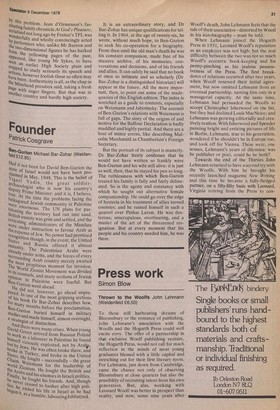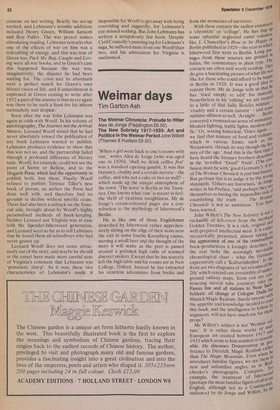Press work
Simon Blow
Thrown to the Woolfs John Lehmann (Weidenfeld E6.50) To those still harbouring dreams of Bloomsbury or the romance of publishing, John Lehmann's association with the Woolfs and the Hogarth Press could well excite envy. The offer of a partnership in that exclusive Woolf publishing venture, the Hogarth Press, would not call for much reflection in the minds of most young graduates blessed with a little capital and stretching out for their first literary roots. For Lehmann, just down from Cambridge, came the chance not only of observing Bloomsbury at close quarters but also the possibility of recruiting talent from his own generation. But, alas, working with Leonard Woolf was better in prospect than reality, and now, some nine years after centrate on her writing. Briefly the set-up worked, and Lehmann's notable additions included Henry Green, William Sansom and Roy Fuller. The war period makes stimulating reading. Lehmann remarks that one of the effects of war on him was a' redoubling of energy, and this was true of Green too. Pack My Bag, Caught and Loving were all war books, and in Green's case this happened because the war was, imaginatively, the disaster he had been waiting for. The crisis and its aftermath were a perfect match for Green's own blitzed vision of life, and if astonishment is expressed at Green ceasing to write after 1952 a part of the answer is that never again was there to be such a feast for his inborn melancholy and despair.
Soon after the war John Lehmann was again at odds with Woolf. In his volume of autobiography, The Journey not the Arrival Matters, Leonard Woolf stated that he had never absolutely vetoed the publication of any book Lehmann wanted to publish. Lehmann produces evidence to show that this was not so, and the partnership failed through a profound difference of literary taste. Woolf, for example, could not see the point of Sartre or Bellow, and so the Hogarth Press, which had the opportunity to publish both, lost them. Finally Woolf refused to publish Terence Tiller's new book of poems, an author the Press had done well with, and therefore had no grounds to decline without specific cause. There had also been a setback on the financial side, brought about by Woolf s highly personalised methods of book-keeping. Neither Leonard nor Virginia was at ease with the Spender-Isherwood generation, and Leonard went so far as to tell Lehmann that he found them all schoolboys who had never grown up.
Leonard Woolf does not come attractively out of the story, and maybe he should at the outset have made more careful note of Virginia's comment that Lehmann was 'persistent, sharp'. As it was, these two characteristics of Lehmann's made it impossible for Woolf to get away with being overriding and niggardly, for Lehmann's eye missed nothing. But John Lehmann has written a scrupulously fair book. Despite Cyril Connolly's punning tag for Lehmann's saga, he suffered more from one Woolf than two, and his admiration for Virginia is undimmed.















































 Previous page
Previous page